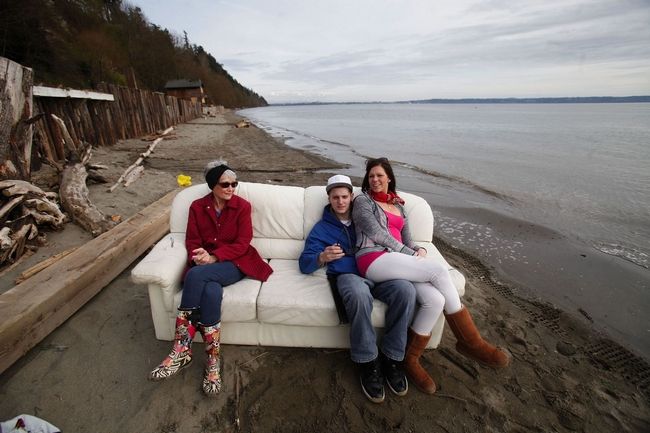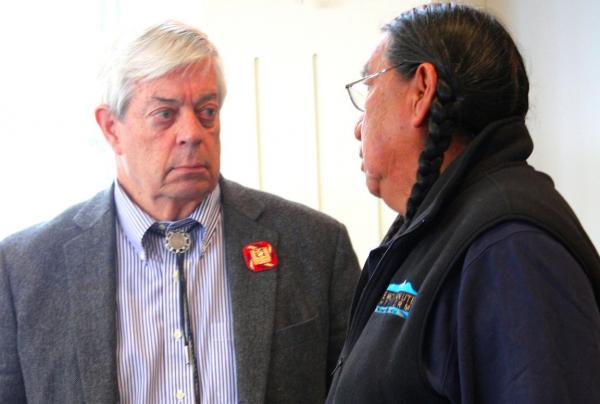By Diana Helfey, The Herald

Nineteen-month-old Chantel Craig died Oct. 8. She and her sister were found in a car on the Tulalip Reservation. The girls were suffering from malnutrition and severe dehydration.
TULALIP — They were asked to inspect the net.
Maybe somehow it can be woven tighter so another little girl won’t fall through, dying before she learns to twirl on tiptoes or color inside the lines or dream of being a princess or a firefighter.
It seems an insurmountable job — searching for all the potential gaps. How do you predict the unimaginable?
It happened in October down a dirt road on the Tulalip Indian Reservation. Chantel Craig and her sister were left in a broken down car, going without food or water for days. The toddlers’ world was restricted to the car seats they were kept buckled into. Their bodies were covered with sores, feces and maggots.
Chantel wasn’t breathing. She had no pulse. She suffered, for how long no one can really say, and then her body gave out. Her sister, 3, fought to stay alive.
Chantel died from neglect, five months shy of her second birthday. Her mother, Christina Carlson, is charged with murder.
Last month, state social workers faced tough questions about their interaction with the girl’s family as a team of experts reviewed the circumstances surrounding Chantel’s death. The examination was required by state law. Findings were made public Thursday.
After six hours of discussion the team didn’t find what the state calls “critical errors” on the part of Children’s Administration employees.
Instead, the panelists made some findings and recommendations for the future, mainly focused on what child welfare workers do to locate families. There’s a need for experienced social workers to handle the cases governed by the Indian Child Welfare Act and consistent review by supervisors. And the girls’ case demonstrates the need to more clearly define the responsibilities of state and Tulalip tribal social workers when conducting joint investigations.
The six-member fatality review committee included a medical doctor, a Marysville police detective, a Snohomish County human services manager and three other professionals connected to social services. They asked questions of the state social worker and her two supervisors. Panelists agreed they were there because of a horrible tragedy. Their conversation, however, was tempered. They all work with families, often in crisis. They know others will slip through.
“These reviews are so important,” said Cammy Hart-Anderson, the division manager for Snohomish County Human Services Department. “I volunteer as a way to assist, offering my perspective from the alcohol and drug field.
“I also believe it’s a way to honor the child who died. We’re trying to do something so her death won’t be in vain.”
The law required the state Department of Social and Health Services to convene the search mission into Chantel’s death — to look for any gaps in a system that relies on cops, courts and social workers to save other people’s children and to help patch together families, many affected by generational poverty, addiction and violence.
The Children’s Administration, a division of DSHS, is tasked with completing a fatality review within six months after a child under state care or receiving state services dies unexpectedly, or nearly dies. The idea is to closely examine how state workers were involved with the child and family, and whether policies and practices can be changed to tighten the safety net.
“We would all love to have a system in place where we never have a child in these circumstances,” said Ronda Haun, a critical incident review specialist with the Children’s Administration.
The state invited a Herald reporter to observe the typically closed-door discussion. The reporter agreed not to attribute to individual participants any statements made during the process. The Herald also agreed not to report information about the child or her family that hadn’t already appeared in public records. The newspaper also delayed publishing a story until the review was completed and available to the public on the state’s website.
Tribal law prevented anyone from the tribes to formally participate in the review.
The committee was advised at the start that they weren’t being asked to conduct a forensic, criminal or personnel investigation. They also were reminded of the complex legal framework that limits the actions of state social workers.
The courts have called parental rights natural and sacred, said Sheila Huber, an assistant attorney general who represents the Children’s Administration.
“Parents have constitutional rights when it comes to the care, custody and control of their children,” Huber said.
There are restrictions on when the state can interfere with those rights, she added.
State and tribal social workers had been investigating allegations that Chantel and her sister were being neglected after receiving a call from their grandmother in December 2011.
Generally the law requires state social workers to close a Child Protective Services investigation within three months. In this case, the social worker kept the investigation open for 10 months, citing concerns because of the mother’s past and her lack of contact with her own family. By keeping it open, the state could offer voluntary services to the parents. In a terrible coincidence, state social workers closed the case hours before Chantel died because they hadn’t been able to find her or her mother.
The state social worker last saw the girls on Dec. 14, 2011. There was no evidence then that they were in imminent danger, which would have been necessary to remove them. There also were no signs of abuse or neglect. The social workers agreed to continue to try to assist the family.
About two weeks after the first visit, the tribal social worker learned that the parents weren’t seeking help for their alcohol and drug abuse problems, as they claimed they were.
The fatality review committee last month questioned the state social worker about the protocols followed to locate families. The team was concerned that there appeared to be a stretch of time that no attempts were made to find the children.
Social workers are allowed to check state databases, including the rolls for those receiving state benefits. Police generally aren’t asked to get involved unless there is concern that a child is a victim of a crime.
Relatives told social workers that Carlson likely was hiding from authorities. She had lost custody of at least three other children because of her drug use and neglect, court papers said.
It is unclear if the Tulalip authorities continued to search for the family.
The Tulalips declined to participate in last month’s child fatality review.
Tribal authorities sent a letter to the state, explaining that the Tribes’ own laws prevent anyone from the tribes from commenting on their social service investigations. That is done to protect children and avoid stigmatizing families, tribal officials told The Herald last year.
Tribal social workers are allowed to share sensitive information with state social workers to assist protecting children and to provide them and their families with services. However, tribal laws don’t contain provisions about information-sharing once a child has died. That conflict prevented the tribal social workers from participating in the review.
In the letter, the Tribes asked the panel to begin the review with a prayer, seeking guidance and healing. The daylong session opened with a moment of silence.
The committee acknowledged the challenge of fully understanding the history of the case without input from tribal social workers. They knew that they were only receiving part of the story and would be left with unanswered questions.
“They were asked to look at the state’s work. I think that objective was accomplished by the committee,” said Haun, who served as one of facilitators. “We are not in the position to review the work of the Tulalip Tribes. That is their responsibility.”
The Tulalips and DSHS have an agreement sharing responsibility for child welfare investigations and providing services to Tulalip children. The agreement is meant to define the role of the state and create cooperation between the two governments.
The role of tribal and state social workers varies depending on the local agreements with specific tribes. There are additional layers of complexity because of the state and federal Indian Child Welfare Acts. The laws govern how states should respond to cases involving Indian children and spell out the tribes’ jurisdiction over their children. The federal act was passed in 1978 in response to the disproportionate number of Indian children being removed from their homes and placed in non-Indian homes away from their tribes.
The Tulalips began assuming jurisdiction over dependency cases more than a decade ago. Their child welfare services program, beda?chelh, investigates all reports of child abuse and neglect. This includes any allegations that aren’t accepted for further investigation by the state.
Among the main recommendations, the panelists encouraged the state and the Tulalips to revisit their local agreement for handling child welfare cases. They concluded that state social workers need more clarification about their individual responsibilities.
For example, state workers have protocols to locate families, but aren’t allowed to seek out tribal families without permission from the tribes to be on the reservation.
The team also urged the state to provide more consistency and stability in the unit specifically assigned to investigate allegations involving tribal children. Social workers need to be familiar with the Indian Child Welfare Act. They should be seasoned workers. Increased stability in the unit would go a long way in building relationships with tribal social workers, the group said.
The team also recommended that if a supervisor leaves the unit, the cases should be reviewed by both the outgoing and incoming supervisor to make sure complex cases don’t get overlooked. The team pointed out that the Carlson case hadn’t been reviewed by a supervisor for months. They questioned whether that was because there had been a change in supervisors.
The panelists also concluded that DSHS should make it a priority to hire CPS social workers and supervisors.
Hart-Anderson said she also walked away from the review convinced that more needs to be done to offer drug and alcohol treatment resources to families.
The county used to partner with DSHS and stationed drug and alcohol counselors in local CPS offices. They were an immediate resource for parents. That program was cut about five years ago for lack of funding.
“Alcohol and drugs are so prevalent in so many CPS cases,” Hart-Anderson said.
In the Carlson neglect case, she is accused of leaving her girls alone for hours on Oct. 8 while she tried to contact a drug dealer. Witnesses told investigators that the 36-year-old mother smoked heroin in the car while the girls were in the backseat. Tests showed that the surviving child had been exposed to opiates.
It is hard to fathom a parent’s neglect for a child, Hart-Anderson said.
“Addiction is a very powerful disease, so powerful that some people are not capable of parenting, and their number one priority is their addiction,” she said.
Social workers have an overwhelming job, Hart-Anderson said.
“As a society we don’t appreciate that enough,” she added.




















